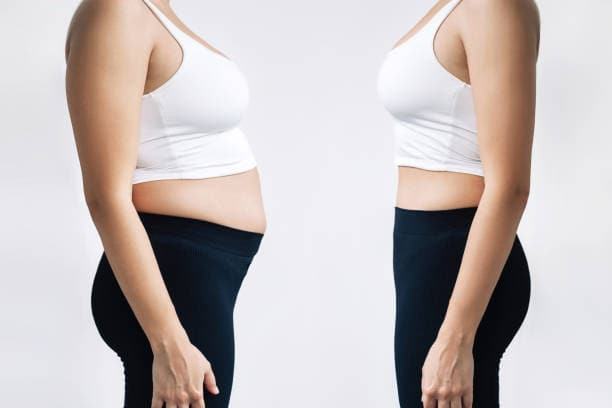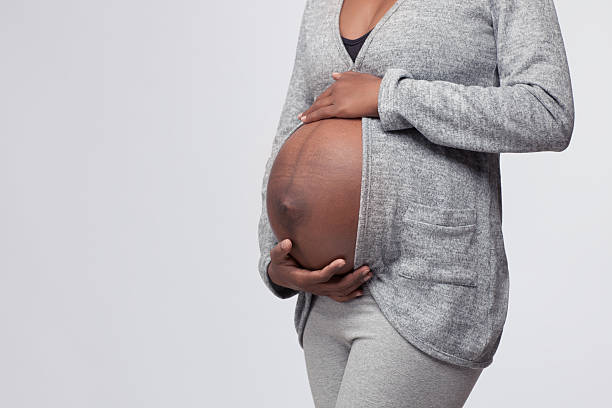Bloating is a common digestive issue that many people experience. It is characterized by a feeling of fullness, tightness, or swelling in the abdomen.
While bloating can be uncomfortable, it is usually not a cause for concern. However, it can sometimes be confused with pregnancy.
Understanding the difference between a bloated stomach and pregnancy is important, as this confusion can lead to anxiety and uncertainty.
Pregnancy, on the other hand, is a state in which a woman carries a developing fetus in her uterus. It is a complex physiological process that involves a variety of changes in the body, including hormonal changes, weight gain, and enlargement of the uterus.
Pregnancy can also cause bloating, but it is usually accompanied by other symptoms such as missed periods, breast tenderness, and nausea.

Key Takeaways
- Bloating is a common digestive issue that can be confused with pregnancy.
- Pregnancy is a complex physiological process that involves a variety of changes in the body.
- While bloating and pregnancy can share some symptoms, they are distinct conditions that require different management approaches.
1. Understanding Bloating

Causes of Bloating
Bloating is a common condition that can be caused by a variety of factors. Some of the most common causes of bloating include gas, constipation, and fiber.
Eating foods that are high in fiber, such as beans and cabbage, can cause bloating in some people. Carbonated beverages can also cause bloating due to the carbonation.
Irritable bowel syndrome (IBS) is another common cause of bloating. This condition can cause diarrhea, constipation, and bloating.
Eating fiber-rich foods, such as whole grains, can help alleviate symptoms of IBS.
Symptoms of Bloating
The symptoms of bloating can vary from person to person. Some people may experience mild discomfort, while others may experience severe pain.
Common symptoms of bloating include flatulence, constipation, and a feeling of fullness in the abdomen.
Treatment for Bloating
There are several over-the-counter remedies that can help alleviate the symptoms of bloating. These include antacids, digestive enzymes, and probiotics.
Eating small meals throughout the day can also help alleviate symptoms of bloating.
Avoiding foods that are high in fructose can also help alleviate symptoms of bloating. This includes foods such as apples, pears, and honey.
Drinking plenty of water can also help alleviate symptoms of bloating by promoting healthy digestion.
In conclusion, bloating can be caused by a variety of factors. Understanding the causes and symptoms of bloating can help individuals find the appropriate treatment.
2. Insights into Pregnancy

Early Signs of Pregnancy
Pregnancy is a beautiful journey that brings joy and excitement to many women. The early signs of pregnancy can vary from woman to woman, but some of the most common signs include missed periods, fatigue, nausea, and breast tenderness.
These early symptoms are caused by hormonal changes in the body, specifically an increase in progesterone and estrogen levels.
Physical Changes in Pregnancy
As the pregnancy progresses, physical changes become more apparent. One of the most noticeable changes is the growth of the baby bump.
This is caused by the expanding uterus and the growth of the fetus. Other physical changes include weight gain, back pain, and abdominal distention.
The third trimester is marked by fetal movement, which can be felt by the mother.
Diagnosis of Pregnancy
There are several ways to diagnose pregnancy, including a home pregnancy test or a visit to the doctor. A home pregnancy test detects the presence of human chorionic gonadotropin (HCG) in the urine, which is produced by the placenta after implantation.
A doctor can also diagnose pregnancy through a blood test or ultrasound.
It is important to note that some women may experience spotting or vaginal bleeding during pregnancy, which can be a sign of a more serious issue. It is important to consult a doctor if any abnormal bleeding occurs.
Additionally, cramping and implantation bleeding can be early signs of pregnancy.
Overall, pregnancy is a unique journey for each woman. While some women may experience bloating during pregnancy, it is important to distinguish between bloating and pregnancy symptoms.
By understanding the early signs of pregnancy, physical changes, and diagnosis methods, women can better prepare for this exciting journey.
3. Bloating vs Pregnancy

Comparative Symptoms
Bloating and pregnancy share some common symptoms, such as nausea, fatigue, and fullness. However, there are some symptoms that are specific to each condition.
For instance, pregnancy is characterized by the development of a baby bump, while bloating is not. On the other hand, bloating can be caused by eating certain foods, such as fried foods and carbs, while pregnancy is not influenced by diet.
Distinguishing Factors
One of the main distinguishing factors between bloating and pregnancy is the presence of a baby. During pregnancy, the expanding uterus puts pressure on the abdomen, causing a visible baby bump.
Bloating, on the other hand, is caused by excess gas in the digestive system, which can cause the abdomen to appear distended.
Another factor that can help distinguish between bloating and pregnancy is the menstrual cycle. If a woman is experiencing bloating during her menstrual cycle, it is likely due to hormonal changes.
However, if the bloating persists after the menstrual cycle has ended, it may be due to other factors, such as diet or an underlying health issue.
When to Consult a Doctor
If a woman is experiencing persistent bloating or other symptoms, it is important to consult a doctor. Bloating can be a symptom of an underlying health condition, such as ovarian cysts or anemia.
Additionally, some women may experience bloating as a side effect of certain medications.
During pregnancy, it is important to attend regular prenatal appointments to monitor the health of both the mother and baby. If a woman experiences any unusual symptoms, such as severe headaches or swelling, it is important to consult a doctor immediately.
In summary, while bloating and pregnancy share some common symptoms, there are several distinguishing factors that can help differentiate between the two. If a woman is experiencing persistent symptoms, it is important to consult a doctor to rule out any underlying health issues.
4. Managing Bloating and Pregnancy

Dietary Changes
Making dietary changes can help manage bloating and pregnancy. Eating small, frequent meals throughout the day can help keep the digestive system moving and prevent bloating.
It is also recommended to avoid foods that are known to cause bloating, such as fried foods, caffeine, and dairy products.
Fiber-rich foods such as whole grains and broccoli can help regulate bowel movements and prevent constipation, which can contribute to bloating. Increasing protein intake can also help maintain a healthy digestive system.
Lifestyle Modifications
In addition to dietary changes, lifestyle modifications can also help manage bloating and pregnancy. Staying physically active can help keep the digestive system moving and prevent constipation.
It is important to engage in low-impact exercises, such as walking or swimming, and avoid high-impact activities.
Drinking plenty of water can also help prevent constipation and bloating. It is recommended to drink at least eight glasses of water per day.
Additionally, probiotics can help maintain a healthy gut flora and prevent bloating.
Overall, managing bloating and pregnancy requires a combination of dietary changes and lifestyle modifications. By making small changes to diet and exercise habits, pregnant women can reduce bloating and maintain a healthy digestive system.
Related post: Question Mark on Pregnancy Test
Frequently Asked Questions
What are the common causes of bloating during pregnancy?
Bloating during pregnancy can be caused by various factors, including hormonal changes, constipation, and the growing uterus pressing on the digestive organs. Eating too quickly, consuming gas-producing foods, and swallowing air while eating or drinking can also contribute to bloating.
How does early pregnancy bloating feel like?
Early pregnancy bloating can feel like a sensation of fullness or tightness in the abdomen. It may also cause discomfort, cramping, or a feeling of pressure. In some cases, bloating may be accompanied by other early pregnancy symptoms, such as nausea, fatigue, and breast tenderness.
What are the differences between bloating and pregnancy symptoms?
Bloating and pregnancy symptoms can be similar, but there are some key differences. Bloating is usually temporary and may be caused by factors such as diet or hormonal changes. Pregnancy symptoms, on the other hand, are caused by the growth and development of the fetus and can include missed periods, breast changes, and fetal movement.
How can you relieve bloating during pregnancy?
There are several ways to relieve bloating during pregnancy, including eating smaller, more frequent meals, avoiding gas-producing foods, staying hydrated, and exercising regularly. Some women may also find relief from bloating by using over-the-counter antacids or digestive aids.
What are the foods that cause bloating in pregnancy?
Foods that may cause bloating during pregnancy include high-fat or fried foods, carbonated beverages, beans, broccoli, cabbage, and onions. Spicy or acidic foods may also contribute to bloating.
What are the signs that indicate bloating or pregnancy?
Signs of bloating may include abdominal discomfort, cramping, or a feeling of fullness or pressure. Pregnancy may be indicated by missed periods, positive pregnancy tests, and other early pregnancy symptoms such as nausea, fatigue, and breast tenderness.

Iesha is a loving mother of 2 beautiful children. She’s an active parent who enjoys indoor and outdoor adventures with her family. Her mission is to share practical and realistic parenting advice to help the parenting community becoming stronger.
